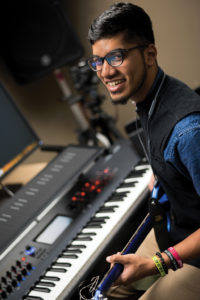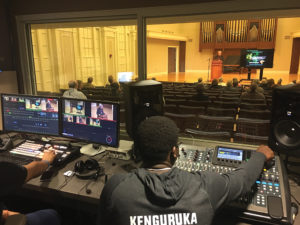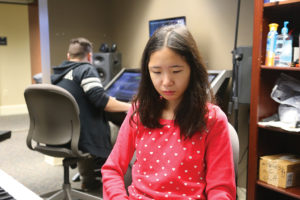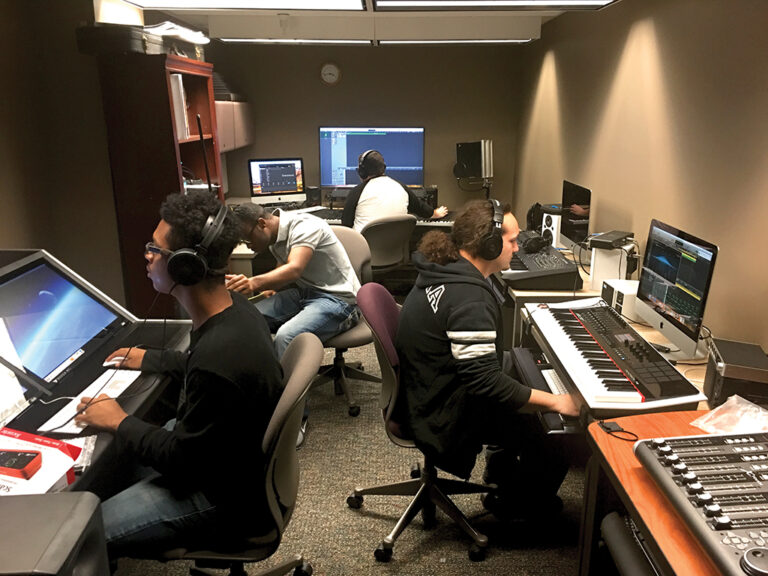Berea’s budding area of interest in electronic music provides new career paths for music students
This summer, Nathan Jose ’20 took a giant step toward fulfilling his ultimate career goals. Jose completed a coveted internship at Sweetwater in Fort Wayne, Ind., working in the company’s recording studio.
For three months, he observed and worked with world-class studio functions, learning about tracking, mixing, mastering, interfacing with customers and producing both music and commercials. He also worked in Sweetwater’s performance theater doing live sound. These are all skills Jose first learned in the Berea Music Department’s burgeoning electronic music area of interest and his labor position with Technology Resource Center (TRC) event production.

From Bengaluru, India, Jose came to Berea as a computer science major, but his love for music soon defined a new direction for his life and career.
“I always wanted to do music and work with artists, helping their shows come to life and giving a good show for the audience,” Jose said. “I really love composition and creating stuff. This new program provides all the tools I need. I don’t usually get to work with expensive gear. But we have all the gear we need to work and write music.”
For Music Department Chair Javier Clavere, creating real-world career opportunities for students like Jose is the driving force behind his creation of electronic music as a new area of interest in the music major.
Often, talented musicians and performance majors find it challenging to find employment in the field after graduation. Clavere’s new area gives Berea’s music majors a leg up in their field by equipping them with additional skills in digital media, composition and production. “I want these students to be career ready,” Clavere said. “We are equipping them to get a job at a recording studio, TV station, writing music for interactive video games, or a whole myriad of rising professions in the music industry.”
To this end, Clavere has spent the past three years acquiring the latest recording and digital composition equipment and creating an electronic music laboratory. Now, students can learn on and experiment with programs that cost hundreds of dollars and equipment that costs thousands of dollars—tools they otherwise would not be able to access.
“Having access to this equipment makes me feel more prepared,” said Imani Vann ’20, a music major from Cincinnati, Ohio. “A lot of the equipment used in the industry is really expensive, so being able to use that equipment before I get into the professional world makes me feel better about the experience I have. Dr. J (Javier Clavere) is preparing us for the future and teaching us to do things that people go to school for professionally or have the money to buy and use at a younger age.”
Vann comes from a family of musicians, and her passion for music runs deep. It is her dream to take the satisfying feeling of creating music and share that with others.

“Being able to be creative and get paid for it is what excites me most about this career field,” Vann said. “I want a job I truly like and not one that just pays the rent. For me, that’s music. Making someone else feel good by something I made is what I aim to do. Music is like a language, and I use it to communicate.”
Striving to give students like Vann every opportunity to pursue their career aspirations, Clavere has partnered with other offices and departments across campus such as TRC, Theatre, and the Office of Internships and Career Development. Internships Director Esther Livingston and Clavere took a group of students on a tour of Sweetwater last school year. That experience allowed Jose to discover the internship opportunities Sweetwater offered.
“These are nationally competitive internships, and they are so hard to get,” Clavere said, explaining that nearly 500 students apply and only four to five are selected.
Jose’s selection for the Sweetwater internship was a win for Berea’s entire Music department, Clavere said.
“They want Nathan back, and now that opens the door for me to potentially send three more students,” Clavere said. “It puts Berea’s name out there and creates awareness about what our students bring to the table.”
Multiple factors set Berea’s students apart in this industry. In addition to their access to and working knowledge of the industry’s leading equipment through Clavere’s composition lab creation, Berea students often add diversity to a field predominantly populated by white males aged 18 to 30.

“Minorities and women are rare in this industry,” Clavere emphasized.
So, industry leaders are eager to balance the playing field while filling their ranks with skilled, professional, experienced young people.
“It starts with the skill,” Clavere clarified. “None of these students will obtain these positions based solely on diversity. But once they have the skills and knowledge companies are looking for, their diverse backgrounds will make them more desirable.”
Couple Berea’s diverse pool of talented students with their added experience in the labor program, and Berea’s students are a recipe for success.
Jose’s experience in his TRC labor position played a large role in successfully landing his Sweetwater internship. TRC staff provide a myriad of multimedia services such as audio/visual conference services, video production and streaming, event production and support, classroom media support and more. This hands-on experience with audio/visual and event production builds upon the skills Jose is learning on the academic side with the electronic music elements of his studies.
“The academic side is learning the equipment and figuring it out,” said Vernon Bentley, TRC multimedia specialist and Jose’s supervisor. “But our focus is on doing it. We do it as a labor skill set, teaching them how to handle themselves in an active, live-event setting.”
Bentley and Clavere began collaborating on how to bring their two naturally converging areas together.
“What I lack is that necessary time to teach students on the technical side; my students need and want more of that,” Bentley said. “His (Clavere’s) students lack the labor side and the practical application of their skills in the field. It goes hand in hand.
“Finding a way to integrate the trade into the curriculum—that’s the ticket,” Bentley continued. “The most successful fields are those where tangible experience in the field is part of the academic journey.”
Clavere and Bentley have teamed up on events like the Carillon concert and other Music department performances where Clavere’s students who do not work in TRC have the opportunity to work with event production and experience the practical application of some of the skills they are developing in the composition lab.
In addition, Music department students also are writing music for play performances in the College’s Theatre department. Daniel Boils, who graduated this past December, helped write the music for “A Mid-summer Night’s Dream” and “Dead Man’s Cell Phone,” two plays produced last spring and this fall, respectively.
After graduating, Boils said he would love to start composing for movies, video games or plays as a full-time career immediately.
“I now have my name on two different plays for theater,” Boils said. “That helps my portfolio, and I can say in a job interview, ‘I’ve done this and this,’ and it will help ease me into the door.”
The emerging electronic music area of interest excites Clavere and his students because it creates a path for them to transition their love of music into a viable career in an industry that is growing rapidly.
“Training needs experience, and experience requires training, so what we’re offering is closing that loop,” Clavere said. “This typically is a selective and brutal business. It is very closed. This flips the light on and allows them to keep that excited feeling they already have about a music career.”


